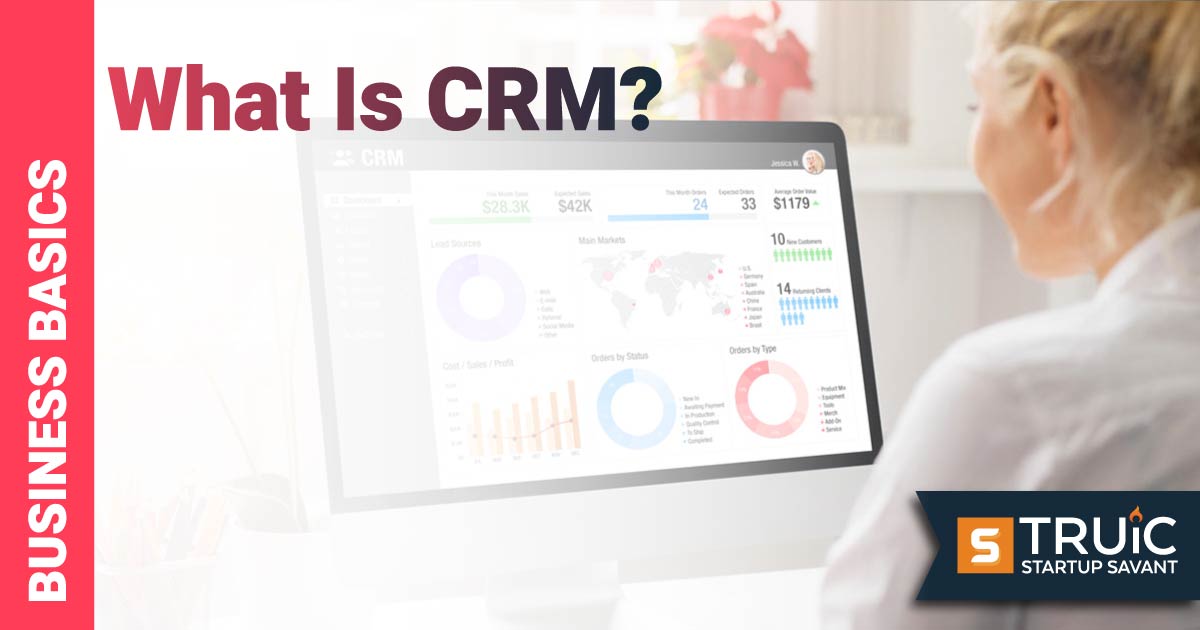Do I Need a CRM System for My Startup Company?

Last Updated: By TRUiC Team
A CRM, or customer relationship management system, can help your business track and manage customer data. This can be essential for startups as it can help them keep track of potential leads and customers.
In this guide, we’ll discuss the signs that indicate you need a CRM system for your startup and provide information on how to choose the right CRM for your business.
8 Signs You Need CRM Software
When you're just starting a company, it's hard to tell if you're investing wisely in software that will have a big impact or if you're a victim of shiny object syndrome. The only true way to understand if you're making the right decision is to learn from those before you.
Below is a list of the most common signs companies see when they decide it's time to invest in a CRM system. Use them to help make an informed decision for your startup.
1. You’re Having Trouble Keeping Up With Customer Information
One of the biggest advantages of having a CRM system is that it manages all your customer information in one place. If you constantly have to search through different software platforms or email threads to find customer information, then it's time to consider a CRM system.
A CRM system will help you keep track of important customer data, including contact information, purchase history, and interactions with your company. This will save you time and help you create better marketing strategies to improve your customer lifetime value.
2. You Struggle to Keep Track of Sales Leads
If your team is strong in marketing, you might never have a problem getting leads in the door, but turning that lead into a sale might be a different story. Tracking every single lead you get and having them go through a series of steps you've previously defined is crucial to getting more sales.
A CRM system can help you see which leads are sales-ready and need to be contacted immediately. It will also track each interaction the lead has had with your company so you can provide them with a more personalized experience.
3. You Lack Data When Making Important Business Decisions
Having a strong internal compass can be a great leadership quality when times get tough, but if all you're going off is your gut for key business decisions, you're putting your company at risk.
Relying on data is the best way to make sound decisions for your business, and a CRM system can give you the data you need to make informed decisions about marketing, sales, and product development.
When you find that you lose 50% of leads at a specific point in your sales cycle, it's easier to pinpoint what needs to be done to fix the problem.
4. You’re Managing a Sales Team
It's hard enough as an owner to keep track of everything you need to do to help your company become successful. When you have a team, it can quickly become a full-time job. Having multiple people in multiple roles can become time-consuming in managing the entire progress.
A CRM system can automate many of the tasks that come with managing a sales team, including onboarding new reps, tracking quotas, and organizing leads. You can use some CRMs to assign different tasks to different team members to easily coordinate your team without long team meetings.
5. Your Accounts Have Multiple Points of Contact
There are few systems more frustrating for the customer than having to talk to multiple people in a company to get one problem solved.
It's a sure way to lose them as a future customer if you're providing a bad customer experience. When you have a CRM system, you can see all the interactions each account has had with your company.
This will help you quickly understand what the issue is and who the best person is to solve it. You can also see what actions have been taken in the past to resolve similar issues. The more data you receive on customer interactions, the better you can accommodate issues when they pop up.
6. You Don't Know Where You Are in the Sales Process With Your Prospects
Getting on the phone with one of your potential prospects and having to ask them where your company is in the selling process is embarrassing and unprofessional. A prospect can easily see the disorganization as a reflection of the brand and go with one of your competitors.
If you want to lock down more sales, you need to be able to see where each prospect is in your sales pipeline. A CRM system will give you a visual representation of where they are and how likely it is that they'll convert into a paying customer based on their previous engagement.
You can even assign team members to a specific task in the sales process so that prospects are always engaging with the team and getting taken care of.
7. You Have Holes in the Hand-Off to Customer Service
There's often a small celebration that happens when new customers join a startup, but one area that's often neglected is the handoff to customer service. Without a proper transition, your new customer could have a bad experience and start off with a negative perception of the company.
A CRM system is able to track all information about a customer in a centralized location so that customer service can easily pick up where your sales team left off.
8. Marketing Qualified Leads Aren’t Getting to Your Sales Reps
Setting up the sales process is only half the battle. Making the minute adjustments required not just to get leads but to get qualified leads is a never ending task.
Your marketing team spends a lot of time and money to generate leads, but if those leads aren't getting to your sales reps, they're not doing their job. A CRM system can help you see which marketing campaigns are generating the most leads and where those leads are falling off so that you can make changes to improve the process.
You can set up automatic notifications with most CRMs that inform your team when a qualified lead is transitioning to the sales team. They don't have to spend the labor managing each account, and you don't have to run the risk of a human error.
Best CRM Software
Looking for the right CRM system for your company? Click below to visit our review of the best CRM software for startups!
4 Signs You Don’t Need CRM Software (Yet)
While a CRM system can be an incredibly valuable tool for startups, there are some cases where it's not necessary. The lean budget of a startup requires cautious planning about where you spend your resources. Here are four signs that you might not need a CRM system just yet.
1. You Have a Small Team
When you're just starting out, and you don't have more than a handful of team members, the need for a CRM system isn't as pressing. You can get by with managing your relationships and sales process through a basic spreadsheet.
The small team could mean you don't have a large amount of capital coming in, which implies your customer base might be small as well. If that's the case, the advanced features of CRM software and the resources you'd invest won't align with the company's goals.
2. You Have No Trouble Keeping Up With Lead Flow
Startups who offer a very high price for their product or service won't have nearly as many leads as companies who have a low to mid-range price. The smaller customer size won't require the same level of organization and management that a CRM system offers.
You could also argue that if you don't have trouble keeping up with lead flow, your sales process is already working well. Why fix what isn't broken? If you're not struggling to keep up with the leads that are coming in, it might not make sense to invest in a CRM system yet.
3. A Different Type of Software May Be a Better Fit for Your Startup
Investing in a CRM system is a commitment to a specific area of your business that you have identified needs help with organization and automation. The only problem is that it may not be an issue a CRM platform will help fix.
It could be that your staff is doing a great job organizing your prospects but having a hard time communicating with each other. You may need team management software that allows everyone to communicate instead of a CRM system.
Talking with your team and looking at the data will help you determine exactly where the bottleneck is occurring so you can make the changes that will help your startup become successful.
4. You Don’t Have a Solid Sales Process in Place
A CRM platform is an incredibly useful tool that has modern technology and is multifunctional, but at the end of the day, it is still just a tool. It can only be as effective as the sales process you have in place.
If you don't have a strong sales process, your CRM system will likely just become another mess that you and your team will need to wade through. This will end up costing your startup valuable time and money you can't afford.
Before making the decision to invest in a CRM system, take a step back and make sure your sales process is as solid as it can be before investing in an entire system.
The Bottom Line
Startups that are more clear on exactly why they would or would not need a CRM system in place are the ones who will be able to make better decisions for their business. If you're still not sure, there are plenty of CRM software providers that offer free trials so you can test out the features and see if it's something that would benefit your startup.
FAQ
What is CRM?
A customer relationship management (CRM) system is a system that helps businesses keep track of their customers. It organizes and automates the sales process and collects information about a customer and their engagement.
What are the benefits of CRM software?
The benefits of CRM software include improving the sales process, client communication, customer marketing, and customer service. Additionally, CRM software can help track customer data and preferences, which can help with future product development or marketing strategies.
What are the downsides of CRM software?
A few potential downsides to using CRM software include a high price, it may be complicated to learn, and it can create more problems for smaller teams who do not need the program.
Do I need a CRM system?
If your company is struggling to keep up with leads, transitioning prospects to customers, or you don't have enough data to make informed decisions, it could benefit from the use of a CRM system.
What are some of the most popular CRM systems?
Salesforce, HubSpot, Zoho, and Pipedrive are some of the most popular and well-known CRM tools available.


